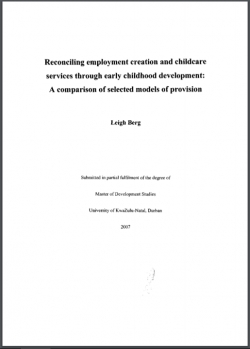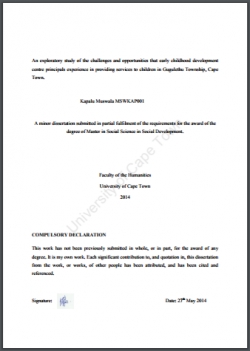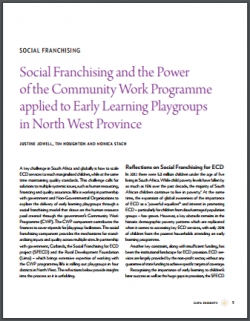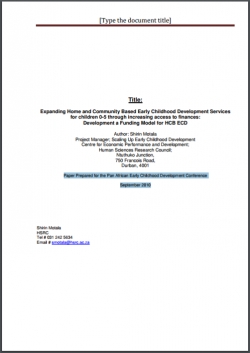Reconciling employment creation and childcare services through ECD: a comparison of selected models of provision

Type
Thesis
Authors
Category
ECCE, Preschool
[ Browse Items ]
Publication Year
2007
Publisher
University of KwaZulu-Natal, Durban, South Africa
URL
[ private ]
Pages
109 p.
Subject
Early child development, ECD, ECD services, Childcare, Centre-based care, Home-based care, Young children, Poverty, Caregivers, Unemployed women, Training, South Africa
Tags
Abstract
Two of the great challenges South Africa currently faces are a crisis in childcare and a crisis of unemployment. South Africa is the first country in the world to implement a public works programme (PWP) in early childhood development (ECD). Millions of South Africa's children live in conditions of poverty and their development is at risk. Few children have access to ECD services. Many centres do not have the required materials or trained practitioners to ensure that those who have access to them develop to their potential. As part of an Expanded Public Works Programme (EPWP), the government has compiled a Social Sector Plan. The EPWP targets poor and unemployed women to provide them with education and training, work experience and an income to help integrate them into the economy while improving the care and educational opportunities for children (DoSD, DoS & DoH, 2004). Furthermore, ECD services can relieve caregivers, who typically work informally, for a few hours enabling them to earn an income (Budlender, 2005:35). A model of home-based childcare has been compared to the centre-based model in terms of employment opportunities and costs (du Toit, 2005). However, alternative models of childcare currently used in the ECD NGO sector have not been considered for the expansion of services. Models differ in their potential to impact children's development, draw women into employment, and support caregivers in unpaid work relative to costs. In addition, they have varying institutional and training requirements, ability to combine with developmental services, use of volunteers and sustainability. These differences need to be analysed and the strengths and weaknesses of each model taken into account when considering which to use for ECD expansion. This report aims to do so.
Description
Thesis (Master of Development Studies)--University of KwaZulu-Natal, 2007
Number of Copies
1
| Library | Accession No | Call No | Copy No | Edition | Location | Availability |
|---|---|---|---|---|---|---|
| Main | 158 | 1 | Yes |




